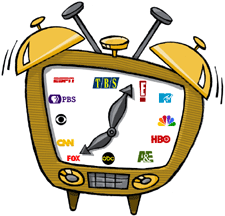Media Literacy 101: Empowering the Viewer
|
This column by television reviewer Rick DuBrow appeared in the Los Angeles Times, March 13, 1993. |
By Rick Du Brow
For 16 years, Elizabeth Thoman has been a unique resistance leader, urging ordinary people to be more critical and skeptical of television.
Her weapon is the pithy, pertinent, Los Angeles-based magazine Media&Values. Her cause is media literacy among viewers - and it has suddenly become an urgent matter as questionable reality shows flood TV, news and entertainment increasingly merge and fake a truck crash on "Dateline NBC" has deepened distrust of the medium.
If media literacy once seemed an ivory-tower concept, it now has a place on the street where you live. Or should.
Of the growing skepticism toward TV, Thoman says: "It's exactly what we've been saying a long time: Media literacy is not just a subject that you study in school, but an attitude toward the world that we live in, because increasingly that world is a media world. What people talk about at lunch is what they saw on television last night.
"Media literacy begins to provide a new compass to navigate the media world. It's not going to change. And it’s where our children are going to live in the 21st Century."
TV's news-as-entertainment splurge was highlighted by the three recent Amy Fisher movies on ABC, CBS and NBC. And the deluge was illustrated again this week when NBC announced upcoming dramas based on the World Trade Center bomb attack in New York; the cult siege in Waco, Tex., and last year's disastrous Hurricane Andrew.
Media literacy does not mean distrusting the details of all such shows automatically; some are obviously better than others. But, says Thoman, viewers must become more aware of the dramatic approach of television programs that routinely blend fact and entertainment:
"The people who write these stories take a grain of truth and embellish it to make it a good story that keeps people watching. We have to learn what the real grain of truth is."
Thoman, whose Center for Media and Values produces workshop and curriculum materials for schools and adult groups, says that the "Dateline NBC" incident showed that television "will alter information in order to increase the audience, and therefore we can't trust it."
As for reality series, Thoman adds to the chorus of those who believe that many television viewers equate programs such as "Hard Copy" with genuine news broadcasts.
"These shows have all the ambience of a news show. They portray themselves as news. They have anchors or hosts or voiceovers. That's not like a movie, where a story unfolds.
"The reason that it's hard for people to distinguish [between news and reality programs] is that it took a decade for the broadcast news world to slowly disintegrate. Up until the '70s, news was still considered a public service to inform the nation."
The change, she adds, resulted from "deregulation during the [Ronald] Reagan Administration, increased commercialization and conglomeratization, when the news divisions had to make money like any other division. But it happened so slowly, we didn't notice it until it was here. There were warnings, prophets in the wilderness. But we didn't catch it in time. How did that get into our living room?
"In the '50s, Ed Murrow set up a standard of news. We still treasure Cronkite. We were really impressed at the way [television] handled the funeral of John F. Kennedy and the moon landing. And then later it all changed under our feet."
In a strong sense, media literacy, as advocated by Thoman and others, is a form of self-defense in a world of exploding, visually mesmerizing information and entertainment.
"Empowerment is a word we use a lot," she says. "When people are not empowered, they can be victimized. When you look at TV passively, you're obviously not engaged by it. To be empowered, you've got to get over your passivity. If you can first engage the media, you are conscious about it, you challenge what's there, and there are skills we can teach people."
The Center for Media and Values, founded by Thoman in 1989 as a teaching-resource expansion of her quarterly magazine, now claims more than 2,000 members "including individuals, schools, churches/synagogues, libraries and community agencies in the U.S. and Canada."
In a notable 15th anniversary issue several months ago, Media&Values ran an article titled Five Important Ideas to Teach Your Kids about TV. The first idea was: "You're Smarter Than Your TV." Says Thoman: "We are humans, we have a brain and TV doesn't. But TV is so powerful and it gets you because it's visual. So one of the first things you have to teach children is that not everything on TV is right or necessarily true and that you're smarter than TV - and that if it doesn't make sense, trust yourself."
Another article in the anniversary issue offers a simple statement by Bill Moyers that is all the more powerful in this era when the emphasis on visually entertaining TV news resulted in the rigged "Dateline NBC" footage. Says Moyers: "Journalists are supposed to gather, weigh, organize and evaluate information - not just put on pictures."
After 16 years, Thoman remains passionate about her goals. Even a recent workshop kit published by her Center for Media Literacy — TV Alert: A Wake-Up Guide for Television Literacy — urges participants in the studies to vent their feelings about the media at home, at work and among friends, and to seek out non-mainstream news sources.
And considering the recent fiascoes of infotainment reality shows, the inglorious season on Amy Fisher and "Dateline NBC," we can use all the healthy skeptics that we can get.



